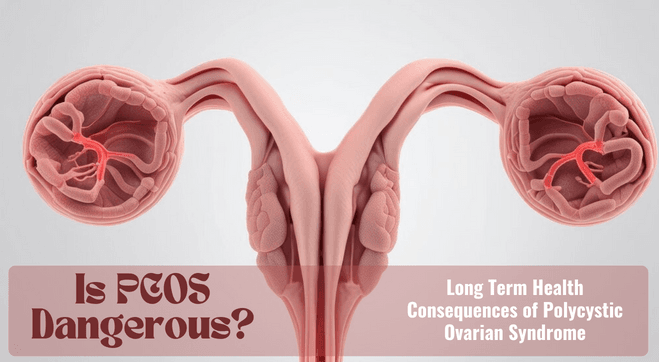Observed in about 10% of the female population, Polycystic Ovarian Syndrome, commonly called PCOS, is a common hormonal disorder. It affects women who are in their reproductive years.1
Symptoms generally include irregular periods, enlarged ovaries, and the appearance of too much hair on the face and other body parts. Additionally, some women may also gain excessive weight, leading to obesity.2
What’s more concerning is the fact that, apart from these symptoms, there are long-term consequences of PCOS.
Heart disease, type 2 diabetes, and cancers related to the breasts, ovaries, and endometrium (the uterus’s inner lining) are the most dangerous complications of PCOS. You must address and manage them timely to avoid the health risks associated with PCOS.
Therefore, if you or your loved one is suffering from PCOS, it is okay to be worried about a few things:
- Is PCOS dangerous?
- What is the difference between PCOS and PCOD?
- Can PCOS cause cancer?
- Which is more dangerous, PCOD or PCOS?
However, while PCOS is indeed dangerous, proper treatment and management can help lower the complications associated with it. In the section below, we have briefly described these complications and how to deal with them.
Metabolic Complications
If you are looking for answers to ‘Is PCOS dangerous for the metabolic system of a woman?’ Here is what you need to know:
PCOS negatively impacts the metabolic functioning of the body. It ultimately results in:
- Hyperandrogenism (overproduction of “male hormones” in the female body)
- Obesity (excess weight gain)
- Diabetes
- Insulin Resistance
Hyperandrogenism: In this condition, the body yields extreme amounts of androgen (or “male” hormones). Androgen is responsible for producing excessive facial and body hair.
Excessive androgen ultimately creates problems and hampers the proper functioning of the following essential metabolic tissues:
- Adipose
- Liver
- Pancreas
- Muscle
Too much androgen can affect the brain as well.
Insulin Resistance: Insulin resistance is when the body produces enough insulin, but the cells become incapable of utilising that insulin. Gradually, the body yields even more insulin because the cells don’t respond correctly to the insulin already produced. It results in hyperinsulinemia.
Do you know that at least 65% to 70% of all women who have PCOS are insulin resistant? 3
Type 2 Diabetes: Diabetes stems from insulin resistance and abdominal obesity. Sadly, even women who are not obese are at a high risk of developing type 2 diabetes if they have PCOS.
Cardiovascular Disease
Is PCOS dangerous for cardiovascular health? Well, since a woman suffering from PCOS is likely to have a disturbed glucose and/or lipid metabolism, the possibility of her developing cardiovascular and other related health issues increases.
Commonly observed cardiovascular diseases in women with PCOS include:
- Hypertension: Hypertension refers to blood pressure levels that are higher than normal. People with hypertension have BP above 140/90 mmHg.4
Various studies have proved that women with PCOS are at a higher risk of hypertension in comparison with women who have regular periods.5
The main factors that contribute to hypertension include insulin resistance, hyperandrogenism, and obesity.
- Systemic Inflammatory Condition: Polycystic ovarian syndrome is related to the enlargement of ovaries. It directly causes an increased risk of systemic inflammation. As a result, patients with PCOS often have a higher volume of inflamed cells circulating in their body.6 It is one of the worst health risks associated with PCOS.
Other complications of PCOS related to cardiovascular diseases include:
- Coronary Artery Disease
- Vascular Injuries
Reproductive Concerns
Lack of menstruation in women with PCOS occurs due to an imbalance of hormones such as:
- Luteinising hormone 7
- Follicle-stimulating hormone, Or FSH
- Androgens
- Estrogen
- Insulin
As a result, patients are at an elevated risk of developing major reproductive problems like:
- Infertility: Since the ovaries of the woman are not producing mature eggs regularly, her chances of getting pregnant decrease significantly. 8
- Gestational Diabetes: In cases where a woman with PCOS manages to get pregnant, she will be at a higher risk of developing gestational diabetes.
- Spontaneous Abortion: In some cases, she might even suffer from an abortion in the first trimester itself.
- Preeclampsia: It is the elevation of blood pressure to extreme levels during pregnancy.9
Other Potential Risks
While PCOS gives rise to a wide variety of metabolic, reproductive, and cardiovascular disorders, it can also be responsible for the development of some types of cancer.
Here is a list of some cancer types generally observed in women suffering from PCOS:
- Endometrial Cancer
- Ovarian Cancer
- Breast Cancer
Among these, the majority of occurrences of endometrial cancer happen due to obesity. Inflammation, insulin resistance, and specific Metabolic Syndrome may trigger other cancers.
Cancer is, therefore, one of the most life-threatening long-term consequences of PCOS.
Apart from this, the question of ‘Is PCOS dangerous for your mental and physical health?’ also carries equal importance. So, if you are looking for the answers to the same, then here are some facts that you must know:
- Women with PCOS are generally at a higher risk of developing depression and generalised anxiety disorder in comparison to women who do not have PCOS.
- PCOS negatively impacts the quality of life of the patient.
So, take a PCOD profile test if you are suspicious that you might be suffering from a reproductive disorder similar to PCOS.
What Happens If PCOS Is Left Untreated?
From the above sections, it is evident that PCOS is dangerous because:
- Firstly, it affects how a woman functions in her day-to-day life by causing psychological and physical symptoms.
- Secondly, it increases the potential for her to develop a life-threatening disease like breast cancer or coronary artery disease.
Therefore, leaving PCOS untreated or neglecting it will only make the condition of hormonal imbalance in women worse and harder to deal with in the future.
If PCOS is left untreated, it can give rise to possible long-term effects or complications like:
- Sleep apnea is a risk factor which can lead to the development of type 2 diabetes and even cause cardiovascular diseases.
- Elevated amounts of bad cholesterol (LDL or Low-Density Lipoprotein)
- High blood pressure
- Heart stroke
- Diabetes mellitus
- Gestational diabetes
- Depression and anxiety 10
Which is More Dangerous, PCOD or PCOS?
PCOD and PCOS should not be confused as being the same thing. Even though both of these conditions are related to the abnormal functioning of the uterus and the ovaries, they have different underlying causes.
PCOD expands to Polycystic Ovarian Disease.
In PCOD, the ovaries tend to release eggs. However, these eggs are not completely mature, and therefore, they may ultimately convert into cysts. PCOD has symptoms similar to PCOS. Just like PCOS, the introduction of certain medications and some lifestyle changes can help a person manage the condition.
Two factors that make PCOD different from PCOS include:
- The egg is released regularly, but alternatively, it will usually come from any of the two ovaries. However, the released eggs will be underdeveloped and not entirely mature. It means that these eggs are not capable of causing conception (pregnancy).
- Moreover, unlike PCOS, in PCOD, the released egg may or may not develop into a cyst.
PCOS, on the other hand, leads to the following:
- Firstly, unlike PCOD, the eggs are not released regularly.
- Secondly, the eggs are most likely to turn into cysts, leading to their accumulation in the ovaries, which causes ovary enlargement. 11
Coming to the answer to the question of which is more dangerous, PCOD or PCOS:
As we have seen above, the symptoms of PCOS are worse and have more life-threatening complications in comparison to PCOD. That is why PCOS is a more dangerous condition among the two.
It does not matter whether it is PCOD or PCOS that a woman is suffering from. Getting the right diagnosis at the right time is essential to preventing the risk of PCOD and the dangers of PCOS. You can take a female hormone test package to have more clarity and eliminate your worries.
Does PCOS Get Worse Over Time?
PCOS generally has a drastic impact on a person’s life as they grow older and get closer and closer to menopause. The long-term effects of PCOS can range from diabetes to heart disease.
The good news is that many women have reported experiencing more regular menstrual cycles as they step closer to menopause.
Unfortunately, menopause and getting older have no impact on other symptoms related to PCOS12. The hormonal imbalance of a woman with PCOS would continue to be the same. Therefore, take a hormonal profile test to check your hormone levels and get an idea of hormonal imbalances.
As one grows older, it is essential to make healthy changes in one’s lifestyle to make sure that the complications associated with PCOS remain at bay.
Some ways to prevent the worsening of the complications associated with PCOS include:
- Consuming a PCOS diet
- Getting engaged in regular physical exercise
- Regularly taking your doctor-prescribed medicines
Adopting an overall healthy lifestyle and Regular Health checkups
Sources
Ref Links:
- Long term health consequences of polycystic ovarian syndrome: a review analysis
- Polycystic ovary syndrome
- Cardiovascular Risk in Women With PCOS
- Ovarian Hypertension: Polycystic Ovary Syndrome
- Systemic and ovarian inflammation in women with polycystic ovary syndrome
- The Role of Polycystic Ovary Syndrome in Reproductive and Metabolic Health
- How polycystic ovary syndrome affects fertility
- Complications and challenges associated with polycystic ovary syndrome
- PCOS (Polycystic Ovary Syndrome) and Diabetes
- Do PCOD and PCOS mean the same thing or are they different
- Polycystic ovary syndrome
- Does Menopause Affect Polycystic Ovary Syndrome (PCOS)









